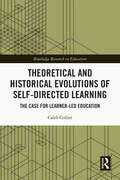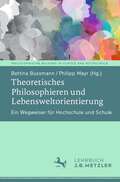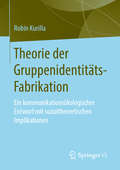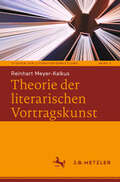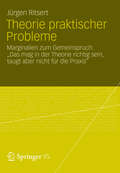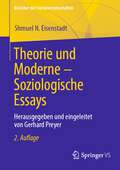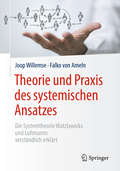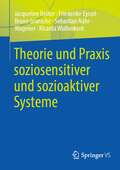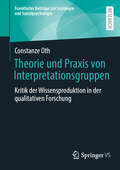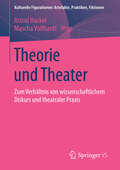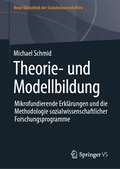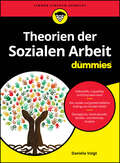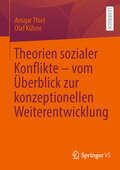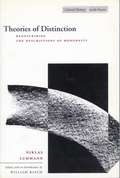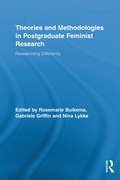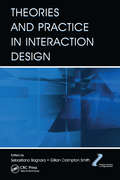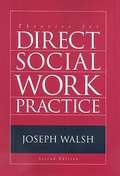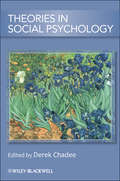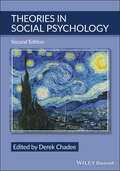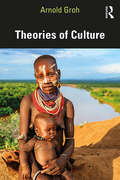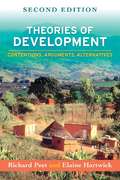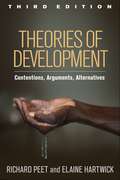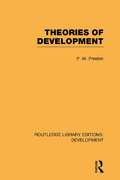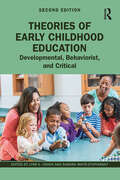- Table View
- List View
Theoretical and Historical Evolutions of Self-Directed Learning: The Case for Learner-Led Education (Routledge Research in Education)
by Caleb CollierThis book analyzes the deep historical and theoretical roots of self-directed learning models in order to put forward a new conceptual understanding of self-directed learning. It utilizes philosophical methods to present arguments, both historical and contemporary, in favor of shifting education toward self-directed models and away from a view of education that places teachers, administration, curriculum, and standards at the center of the learning endeavor. This book demonstrates that self-directed learning has proven to be effective in numerous contexts and builds on this history to present a new philosophy of education termed "Eudemonic Self-Directed Learning," for individual and societal flourishing. Exploring exemplars from different cultural and historical settings to inform post-pandemic pedagogies and policies, this book will appeal to scholars and researchers of the history and philosophy of education, with interests in self-directed learning and its potential for contemporary practice.
Theoretisches Philosophieren und Lebensweltorientierung: Ein Wegweiser für Hochschule und Schule (Philosophische Bildung in Schule und Hochschule)
by Philipp Mayr Bettina BussmannDie globalen Veränderungen fordern unser Wissen über die Welt und über uns selbst heraus. Der Klimawandel, die globale Covid-19-Pandemie und Konflikte um die Bedeutung wissenschaftlicher Erkenntnisse führen uns unweigerlich zu einer Vielzahl komplexer philosophischer Fragen. Dabei rücken verstärkt Themen der theoretischen Philosophie in den Vordergrund: Was ist eigentlich Wissen? Auf welche Informationen können wir uns verlassen? Ist die Wahrheit relativ? Was macht ExpertInnen aus? Was ist gute wissenschaftliche Praxis? Was bedeutet ‚evidenzbasiert‘? Welchen sozialen und globalen Einflüssen ist unser Wissenserwerb ausgesetzt? In der Ausbildung von Philosophie- und Ethikstudierenden gibt es oft eine große Scheu, Disziplinen wie Erkenntnistheorie und Wissenschaftsphilosophie zu erlernen und zu unterrichten. Zu abstrakt und lebensweltlich irrelevant, sagen viele. Dieses Buch soll diese Berührungsängste beseitigen helfen, indem die theoretischen Grundlagen auf die Probleme der Gegenwart angewendet und mit vielseitigen Methoden erschlossen werden. Zwei Ziele stehen im Vordergrund: Zum einen soll deutlich werden, dass die Beschäftigung mit theoretischer Philosophie für das persönliche und das gesellschaftliche Zusammenleben von zentraler Bedeutung ist. Zum anderen zeigen eine Reihe didaktischer Tools, wie man Lernende dabei aktiv in den Lernprozess miteinbezieht.
Theorie als Beruf: Festschrift für Wolfgang Schluchter (Studien zum Weber-Paradigma)
by Ulrich Bachmann Thomas SchwinnDie Beiträge des Bandes beleuchten die Bandbreite der Anwendbarkeit einer Soziologie im Anschluss an Max Weber: von Fragen der Religion oder der Medizin, über den Bereich der Bildung und Wissenschaft bis hin zu aktuellen Problemen der Gewalt oder der Klimakrise. So werden für eine soziologische Theorie nach Max Weber vielfältige Anwendungsfelder und neue Perspektiven facettenreich und interdisziplinär erschlossen.
Theorie der Gruppenidentitäts-Fabrikation: Ein kommunikationsökologischer Entwurf mit sozialtheoretischen Implikationen
by Robin KurillaBisher gibt es keine umfassende und kohärente Annäherung an die Bestimmung der an der Konstruktion von Gruppenidentitäten beteiligten kommunikativen und präkommunikativen Prozesse. Die vorliegende Untersuchung schließt diese Lücke durch die Entwicklung einer einheitlichen theoretischen Grundlage, mit der sich empirische Konstruktionsprozesse erfassen lassen. Überdies leistet sie einen Beitrag zur Domäne der Gruppenkommunikationsforschung. Es wird ein grundlagentheoretisches Flussbett geschaffen, das eine begriffliche Fundierung der Konzeption von Inter- und Intragruppenkommunikation liefert, die nicht von ‚objektiven’ Kategorien ihren Ausgang nimmt, sondern von de facto stattfindenden Vergesellschaftungsprozessen. Zudem wird am Beispiel der Gruppenidentitätskonstruktion die Architektur einer innovativen Sozialtheorie vorgestellt, die den Ansprüchen kommunikationswissenschaftlicher und womöglich auch in anderen Disziplinen zu verortender Erkenntnisinteressen genügt.
Theorie der literarischen Vortragskunst (Studien zur Literaturvermittlung #5)
by Reinhart Meyer-KalkusTheoretische Ansätze zur Analyse literarischer Vortragskunst thematisieren gewöhnlich nur Teilaspekte, aber nicht das Zusammenspiel aller ihrer Faktoren, also von Akteuren, Zuhörern, Räumen, Performances, Vortragsvorlagen und Medientechniken. Auf der Grundlage von Goffmans Performance-Begriff und der amerikanischen Ethnographie des Sprechens entwickelt das vorliegende Buch eine umfassende Konzeption der Vortragskunst als Interaktionsritual und greift dabei auf sprech- und literaturwissenschaftliche Formanalysen zurück, um die Vortragsstimme, ihre unterschiedlichen Sprechgattungen und prosodischen Ausdrucksmittel zu beschreiben.
Theorie praktischer Probleme
by Jürgen RitsertDer Problembegriff findet mit ebenso großer Selbstverständlichkeit wie Häufigkeit sowohl in der Alltagssprache als auch in der Wissenschaftssprache Verwendung. Es handelt sich um einen Allerweltsbegriff für vielfältige Arten theoretischer und praktischer Schwierigkeiten. Das Buch diskutiert Ansätze, worin der Problembegriff eine zentrale Rolle spielt. Es wird deutlich: Kant hat Recht, wenn er trotz aller Unterschiede und Gegensätze zwischen Theorie und Praxis auf der Unhaltbarkeit des "Gemeinspruchs" besteht: "Das mag in der Theorie richtig sein, taugt aber nicht für die Praxis.
Theorie und Moderne – Soziologische Essays: Herausgegeben und eingeleitet von Gerhard Preyer (Klassiker der Sozialwissenschaften)
by Shmuel N. EisenstadtDer Band versammelt wichtige Texte von Eisenstadt zum Thema "Soziologische Theorie und Moderne", die das gesamte Spektrum der umfassenden Forschungen von Eisenstadt repräsentieren.
Theorie und Praxis des systemischen Ansatzes: Die Systemtheorie Watzlawicks Und Luhmanns Verständlich Erklärt
by Joop Willemse Falko Von AmelnDieses Buch bietet eine verständliche Einführung in das systemische Denken und Arbeiten auf der Grundlage der neueren Systemtheorie. Es führt dabei erstmalig zwei Perspektiven und Theorierichtungen in einem Werk zusammen: Die Systemtheorie Paul Watzlawicks sowie den soziologischen Ansatz von Niklas Luhmann. Ziel ist es, die Grundlagen des systemischen Arbeitens für Studierende, Dozenten und Praktiker eingängig und alltagsnah zu erklären, mit klaren Definitionen und zahlreichen Beispielen aus allen Lebensbereichen. Das Buch ist geeignet für die Vertiefung im Studium und für die Anwendung in Therapie, Beratung und sozialer Arbeit. Dabei werden die Praxisfelder Familie, Wohngruppen und Organisationen besonders beleuchtet. Leserinnen und Lesern dieses Buches werden die Denkweisen der genannten Theorien auf unterhaltsame Weise vermittelt und ein selbstständiger, kreativer Umgang mit ihnen ermöglicht.
Theorie und Praxis soziosensitiver und sozioaktiver Systeme
by Friederike Eyssel Bruno Gransche Jacqueline Bellon Sebastian Nähr-Wagener Ricarda WullenkordInteraktive technische Systeme sind zunehmend Teil unseres Alltags. Wie aber kann gelingende Mensch-Technik-Interaktion gestaltet werden? Welche Rolle spielen Aspekte sozial angemessenen Umgangs? Für das menschliche Zusammenleben haben sich in jeder Gesellschaft Kulturtechniken des Verhaltens und des Umgangs entwickelt. Wer sie beherrscht, weiß, wann bestimmte soziale Praktiken wie etwa Entschuldigungen angebracht sind und wie sie vollzogen werden. Können und sollten auch Assistenzsysteme mit derartigen Fähigkeiten ausgestattet werden? Das in diesem Buch vorgestellte, interdisziplinär orientierte Rahmenmodell der „FAktoren der Sozialen Angemessenheit“ (FASA-Modell) bietet eine strukturierte Annäherung an die Thematik und liefert eine Grundlage für eine hinsichtlich sozialer Angemesseneheit reflektierte Gestaltung soziosensitiver und soziaktiver Assistenzsysteme.
Theorie und Praxis von Interpretationsgruppen: Kritik der Wissensproduktion in der qualitativen Forschung (Frankfurter Beiträge zur Soziologie und Sozialpsychologie)
by Constanze OthDie Auswertung qualitativen Datenmaterials in Interpretationsgruppen und Forschungswerkstätten ist mittlerweile zu einem methodenübergreifenden Qualitätsstandard avanciert. Es besteht jedoch ein eklatantes und irritierendes Forschungsdesiderat. Um mehr darüber zu erfahren, was in solchen Gruppen geschieht und woher das große Qualitätsversprechen rührt, hat die Autorin Theorie und Praxis von Interpretationsgruppen beforscht. In dieser Arbeit setzt sie sich kritisch mit dem Forschungsstand und den Selbstverständnissen der Gruppeninterpretationspraxis auseinander. Dabei identifiziert sie eine Verschiebung vom Anspruch einer Demokratisierung des Wissens hin zu einem Qualitätsversprechen des besseren Wissens durch Intersubjektivität. Weiter hat sie unterschiedliche Gruppen mit einem (auto-)ethnographischen Forschungsansatz empirisch beforscht und das erhobene Material tiefenhermeneutisch ausgewertet. Ihr Forschungsinteresse galt dabei stets den Bedingungen kritischer Wissensproduktion. Vor diesem Hintergrund stellen sich Fragen an die Gruppeninterpretationspraxis: Wie wollen wir Wissen produzieren? Wie wollen wir (miteinander) arbeiten? Und wie können Räume, wie sie etwa von Interpretationsgruppen und Forschungswerkstätten geschaffen werden, besser und solidarischer genutzt werden?
Theorie und Theater: Zum Verhältnis von wissenschaftlichem Diskurs und theatraler Praxis (Kulturelle Figurationen: Artefakte, Praktiken, Fiktionen)
by Astrid Hackel and Mascha VollhardtDie Theaterwissenschaft beruft sich gern auf den gemeinsamen Ursprung von Theorie und Theater. Ein Grund zu fragen, auf welche Weise akademische Diskurse Eingang in zeitgenössische Performances, Tanz- und Theaterinszenierungen finden und was diese umgekehrt zur Vermittlung oder sinnlichen Fremdwerdung theoretischen Wissens beitragen können. Untersucht werden die zahlreichen Verflechtungen und Unwägbarkeiten zwischen Theorie und Theater, die szenische Selbstreferenzialität und Widerständigkeit gegen die eigene Theoretisierbarkeit, die Herausforderungen im Umgang mit humanwissenschaftlichen, (post-)feministischen und queeren Theorien sowie der Stellenwert von Sprache, Sinn und Sinnlichkeit in zeitgenössischen Inszenierungen.
Theorie- und Modellbildung: Mikrofundierende Erklärungen und die Methodologie sozialwissenschaftlicher Forschungsprogramme (Neue Bibliothek der Sozialwissenschaften)
by Michael SchmidDer Band geht der Frage nach, unter welchen epistemologischen wie methodologischen Bedingungen es möglich sein könnte, die Sozialwissenschaften im Allgemeinen und die Soziologie im Besonderen – trotz des starken systemtheoretischen, pragmatistischen, narrativistischen bzw. cultural-studies-geprägten, praxeologischen, zeitdiagnostischen wie phänomenologisch-hermeneutischen oder poststrukturalistischen Gegenwinds – als eine „erklärende Handlungswissenschaft“ zu etablieren und voranzutreiben.
Theorien der Sozialen Arbeit für Dummies (Für Dummies)
by Daniela VoigtTheorien – ganz schön schlau und gar nicht grau Die Soziale Arbeit ist eine Handlungswissenschaft, vergleichbar mit einem Werkzeugkasten. Aber was nutzen die Werkzeuge, ohne zu verstehen warum? In diesem Buch erhalten Sie eine breite Auswahl an theoretischem Wissen, das auf den Arbeitsalltag in sozialen Berufen zugeschnitten ist. Egal, ob Sie ein Neuling, erfahrener Profi oder Studierender sind, hier finden Sie präzise und verständliche Informationen, die Ihnen helfen, die Theorien der Sozialen Arbeit zu verstehen und auf Ihre Praxis zu übertragen. Sie erfahren Was sich hinter Begriffen wie Empowerment, Capability oder Lebensweltorientierung verbirgt Welche traditionellen Theorien, angepasst auf die heutige Praxis, noch aktuell wichtig sind Was für konkrete Handlungsempfehlungen sich aus den Theorien ableiten lassen
Theorien sozialer Konflikte – vom Überblick zur konzeptionellen Weiterentwicklung
by Ansgar Thiel Olaf KühneDieses Buch bietet nach einem niederschwelligen Einstieg eine Orientierung über verschiedene Theorien zum sozialen Konflikt und deren Potenziale, Konflikte zu verstehen, um mit ihnen konstruktiv umgehen zu können. Es werden zunächst klassische Theorien sozialer Konflikte (Coser, Glasl, spieltheoretische Zugänge, Dahrendorf, Luhmann) kurz vorgestellt. Darauf basierend werden zwei ausgewählte theoretische Perspektiven auf den sozialen Konflikt, die konflikttheoretischen Ansätze von Ralf Dahrendorf und Niklas Luhmann, weiterentwickelt. Die Konflikttheorie Dahrendorfs wird dabei mit einer differenzierten Variante seines Lebenschancenansatzes kombiniert. Die Luhmannsche Konflikttheorie wird um eine theoretische Erörterung von Eskalationsdynamiken und Deeskalationsarchetypen erweitert. Mit einen Fallbeispiel zu Landschaftskonflikten im Kontext der Energiewende verdeutlichen die Autoren das Potenzial der behandelten Theorien, die Entstehung, Stabilisierung und Eskalation solcher Konflikte zu erklären.
Theories Of Distinction: Redescribing The Descriptions Of Modernity (Cultural Memory In The Present)
by Niklas Luhmann William RaschThe essays in this volume by Germany's leading social theorist of the late twentieth century formulate what he considered to be the preconditions for an adequate theory of modern society. The first two essays deal with the modern European philosophical and scientific tradition, notably the ogy of Edmund Husserl. The next four essays concern the crucial notion of observation as defined by Luhmann. They examine the history of paradox as a logical problem and as a historically conditioned feature of rhetoric; deconstruct the thinking of Jacques Derrida, especially his language-centered allegiances; discuss the usefulness of Spencer Brown's Laws of Form; and assess the consequences of observation and paradox for epistemology. The following essays present Luhmann's theory of communication and his articulation of the difference between thought and communication, a difference that makes clear one of Luhmann's most radical and controversial theses, that the individual not only does not form the basic element of society but is excluded from it altogether, situated instead in the environment of the social system. The book concludes with a polemic against the critical thought of the Frankfurt School of postwar German social thought.
Theories and Methodologies in Postgraduate Feminist Research: Researching Differently (Routledge Advances in Feminist Studies and Intersectionality)
by Gabriele Griffin Rosemarie Buikema Nina LykkeThis volume centers on theories and methodologies for postgraduate feminist researchers engaged in interdisciplinary research. In the context of globalization, this book gives special attention to cutting-edge approaches at the borders between humanities and social sciences and specific discipline-transgressing fields, such as feminist technoscience studies.
Theories and Practice in Interaction Design
by Craig E. RasmussenAd hoc and interdisciplinary, the field of interaction design claims no unified theory. Yet guidelines are needed. In essays by 26 major thinkers and designers, this book presents the rich mosaic of ideas which nourish the lively art of interaction design. The editors introduction is a critical survey of interaction design with a debt and contribut
Theories for Direct Social Work Practice 2nd Edition
by Joseph WalshWalsh's concise, comprehensive text covers eleven major clinical practice theories that social workers commonly use in their assessment, planning, and intervention tasks with individuals, families, and groups. The book offers you a broad view of the field of practice, while still providing a close-up view of each theory discussed.
Theories in Social Psychology
by Derek ChadeeTheories in Social Psychology is an edited volume that identifies and discusses in-depth the important theoretical perspectives and theories that underlie the discipline of social psychology. The only current book focusing specifically on the theories within social psychology Brings together a range of distinguished scholars in the field of social psychology – including Bertram F. Malle, Paul R. Nail, Richard E. Petty, Thomas Mussweiler, Faye J. Crosby, Miles Hewstone, Richard J. Crisp and Mein Koslowsky Critically discusses important perspectives and theories in the discipline allowing a deeper understanding of the theoretical framework Allows students and academics to reflect on theories and opens up future areas of enquiry
Theories in Social Psychology
by Derek ChadeeTHEORIES IN SOCIAL PSYCHOLOGY Theories in Social Psychology develops a deeper, more robust understanding of the theoretical framework underlying the field. Providing rich insights into the central theories and perspectives that continue to shape the discipline, this edited volume brings together a panel of distinguished scholars to address thirteen social psychological theories relating to social cognition, social comparison, social reinforcement, and self. In-depth critical discussions examine topics including cognitive dissonance, reactance, attribution, social comparison, relative deprivation, equity, interdependency, social identity, and more. The expanded second edition fills a substantial gap in current literature by articulating the important psychological theories rather than placing emphasis on applied research. New and revised content helps students understand the construction and complexity of key theories while inspiring researchers of social behavior to reflect on their current work and consider future areas of investigation. This comprehensive resource: Identifies and discusses the theoretical perspectives and specific theories that form the foundation of the study of social psychology Features work from leading scholars including Bertram F. Malle, Paul R. Nail, Richard E. Petty, Thomas Mussweiler, Faye J. Crosby, and Miles Hewstone Helps students move from introductory concepts to multifaceted theoretical frameworks Theories in Social Psychology, Second Edition, remains the perfect textbook for academics and students wanting to study and discuss important social psychological perspectives and theories and attain a deeper understanding of the theoretical framework. “This book will be a very valuable tool for students and professionals alike who wish to learn theories in social psychology and the role they have played in the development of the discipline. It is comprehensive in its coverage and covers the theories in an objective and engaging way.” —Robert J. Sternberg, Professor, Department of Psychology, College of Human Ecology, Cornell University, Honorary Professor of Psychology, University of Heidelberg, Germany “In this wonderful new edition of compilation of theories, at the core of modern social psychology, presented to us by Derek Chadee, we are given a special gift that enriches scholars, teachers and students of psychology in social and general psychology. We are treated to a clear exposition of these theories some of the research and controversy that each has generated, and are given some guidelines to new paths for future exploration of their implications. My research career has benefitted from working in the domains of dissonance, attribution, and social comparison theories, but my teaching and textbook writing has relied on all of the theories and their concepts so elegantly orchestrated here.” —Phillip G. Zimbardo, Ph.D., Professor Emeritus, Stanford University
Theories of Culture
by Arnold GrohThis authoritative but concise guide describes the most significant cultural theories from the 19th to the 21st century and their originators, as well as the links between them and their mutual influences. This guide explores ideas around what culture is, when and why cultures change over time and whether there are any rules or principles behind culture-related phenomena and processes. For those seeking to answer questions on culture, familiarity with these topics is essential. From refugee movements caused by wars, to the ongoing demographical changes in regions of the world like sub-Saharan Africa or the Indian subcontinent, understanding the underlying mechanisms of culture-related processes has become an immediate and essential task. Covering everything from the processes of cultural change to counterculture and destabilisation, the book explains different ideas in a clear and objective fashion and includes approaches that have been unduly neglected but which have high explanatory value regarding culture and its phenomena. Providing readers with an up-to-date idea of what culture is, and how our understanding of it has been established over the past century, this text is the perfect companion for advanced undergraduates, postgraduates and researchers.
Theories of Development, Second Edition
by Richard Peet Elaine HartwickWidely adopted, this text critically evaluates the leading theories of international economic development, from classical economic and sociological models to Marxist, poststructuralist, and feminist perspectives. No other book provides such comprehensive coverage or links the theories as incisively to contemporary world events and policy debates. Reexamining neoliberal conceptions of economic growth, the authors show what a more just and democratic form of development might look like today. New to This Edition Revised to reflect evolving global economic realities. Updated with the latest concepts and empirical data. Additional chapter on classical and neoclassical economics. Increased coverage of real-world policy issues.
Theories of Development, Third Edition
by Richard Peet Elaine HartwickThis widely adopted text starts with the fundamentals--what is economic growth, what is development, and what is the relationship between these two concepts? The authors examine orthodox theories of growth grounded in different schools of economics (classical, neoclassical, Keynesian, neoliberal) before considering critical alternatives (Marxist, socialist, poststructuralist, and feminist). The book elucidates the basic ideas that underpin contemporary controversies and debates surrounding economic growth, environmental crisis, and global inequality. It highlights points of contention among the various theories, links them to historical and current world events, and works toward envisioning a form of development that makes life better for all. New to This Edition *Reflects the latest data and global development trends, such as the effects on economies of extreme weather events and climate change. *New discussions throughout the chapters, including the work of Thomas Piketty, Richard Florida, William Easterly, Niall Ferguson, and Arturo Escobar. *Responds to current crises, including the global financial meltdown and its consequences and the rise of finance capitalism.
Theories of Development: An Introduction To Classical And Contemporary Theories Of Development And Their Application To Southeast Asia (Routledge Library Editions: Development)
by Peter PrestonDr Preston’s book, first published in 1982, presents a critical history of development studies since the Second World War, linking the recent, neo-Marxist, debate with the whole tradition in the field, going back to the work of economists like Arthur Lewis. He identifies a series of ‘schools’ and evaluates their contribution, supplying in each case a careful analysis, informed by the sociology of knowledge, of the work of its leading theorists. His final assessment draws on the critical theory of Habermas, arguing that social theorising is essentially practical; a matter of the construction, criticism and comparative ranking of ideologies, and that theorists should therefore consider what it makes sense for them to do or say, given their circumstances and the problems they address.
Theories of Early Childhood Education: Developmental, Behaviorist, and Critical
by Lynn E. Cohen Sandra Waite-StupianskyTheories of Early Childhood Education continues to provide a comprehensive overview of the various theoretical perspectives in early childhood education from developmental psychology to critical studies, Piaget to Freire. This revised and updated edition includes additional chapters on Michael Alexander Halliday’s view of language learning and the attachment theory work of John Bowlby and Mary Ainsworth. Each author questions assumptions underpinning the use of theory in early childhood education and explores the implications of these questions for policy and practice. Theories reported in this book are a timely reminder of the importance of the relationship between theory and practice necessary for teacher candidates, teacher educators, and early childhood teachers. Students will learn the fundamentals while in-service teachers and professionals will learn the theory behind field observations for their certification exams.
